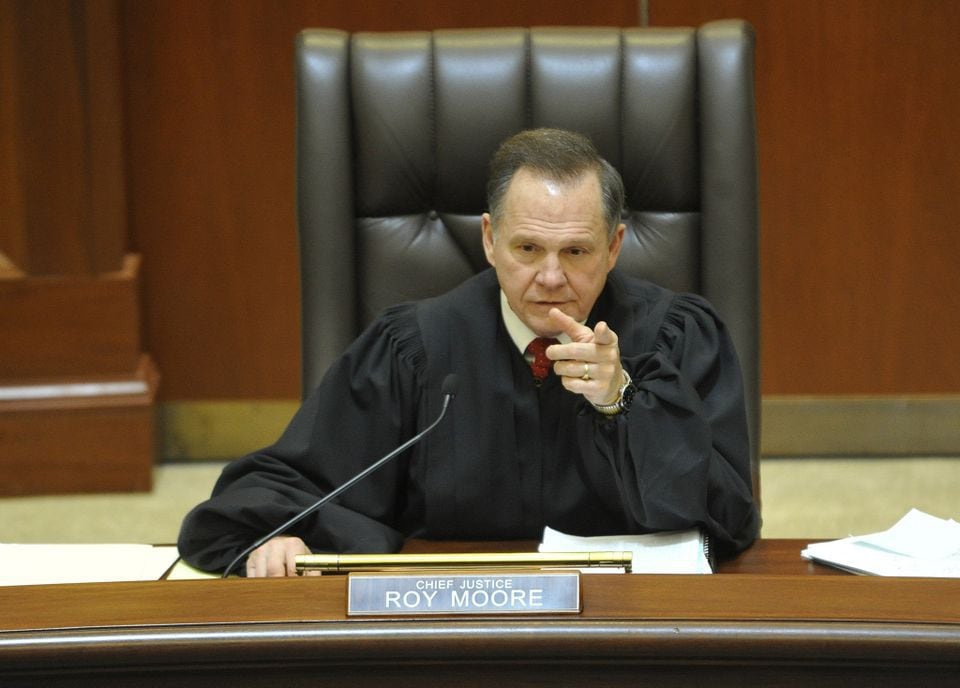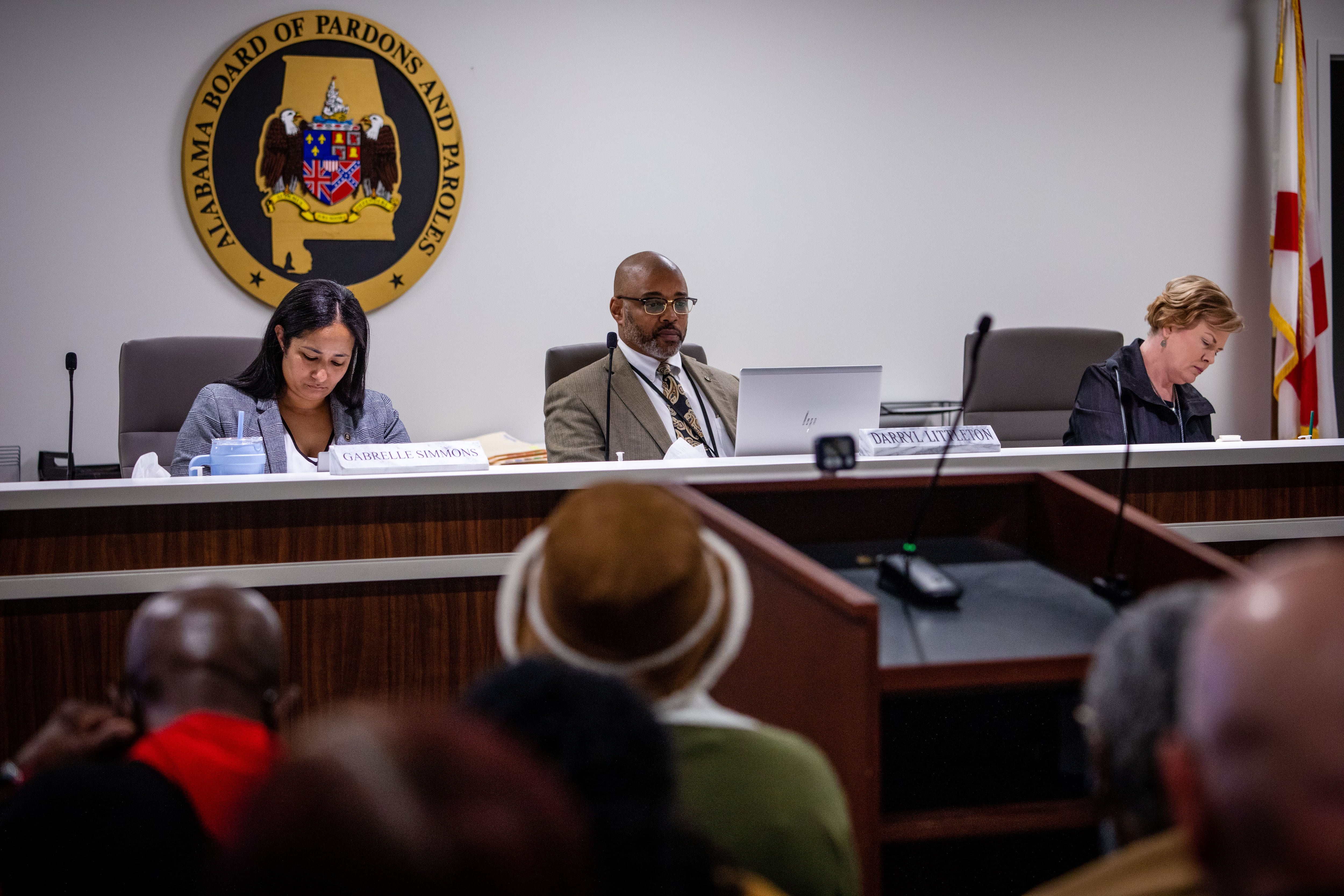For the third time, the case of Willie Conner was before the Alabama parole board. The state had denied his release twice before, each time sending him back to prison where he sat for years after stealing a nail gun from Lowe’s.
The parole board chairperson argued against letting him out, just as she had before. But Conner had a powerful ally in the room: Former Alabama Supreme Court Chief Justice Roy Moore.
“It’s completely crazy that they would want to fight it like this,” said Moore, who had been troubled by Conner’s case for years. “But that’s the system. It’s a battle going on.”
Last week, Moore stood in front of the three-person parole board in downtown Montgomery, arguing that Conner deserved another chance.
Conner, 59, has already served more than 12 years for stuffing a roofing nailer in his pants and walking out of a Lowe’s store in Foley, not far from the Alabama beaches. That case, combined with his record of theft, left Conner facing a sentence of life behind bars.

“I know this case better than most, better than the attorney general,” Moore told the parole board. “He’s guilty of shoplifting… if I were Willie I would be very angry, but he’s not.”
But the meeting grew contentious, as board chairperson Leigh Gwathney at length challenged Moore on the letter of the law, arguing about the definition of robbery. At one point, Moore was so taken aback by a claim from a victim’s group that he rose to argue, only to have Gwathney tell the former chief justice: “Please be seated.”
Moore later told AL.com he wasn’t surprised at the back and forth with Gwathney, saying the board is out of step with the public.

“People want justice. They want bad people to stay in, they want people that are worthy of parole to get out. That’s the system,” Moore said. “That’s what it’s supposed to be. But that’s not what it’s been.”
“What it’s been is a representative of the attorney general’s office controlling the parole board in my opinion.”
The hearing
For stealing the nail gun, Conner was charged with the more serious crime of robbery. At the time of his 2013 conviction, Conner had three prior convictions, which meant he faced a mandatory sentence of life in prison. His past convictions included property and drug crimes.
That same year, a south Alabama judge ordered he be given the opportunity for parole, despite prosecutors’ request that Conner spend the rest of his life behind bars without parole consideration.
Following his conviction over the nail gun, Conner’s case went to the Alabama Supreme Court in 2014. One of those justices, the top seat on the court, agreed with his argument. But it didn’t matter, as a majority of the court voted not to review Conner’s case.
That man who agreed with Conner was Moore.
Moore, the chief justice at the time, again issued a dissent when the case came back to the state’s top court in 2016.
Following his tenure on the court, Moore reached out to Conner. Moore’s law firm, the Foundation for Moral Law, began to represent Conner. Moore has always maintained Conner was convicted after an illegal indictment.
“They got an indictment based on a fact that they knew did not happen. He did not have a gun,” Moore told AL.com.
On Thursday, a decade after Moore first wrote a dissenting opinion in the case, he took up the case in person before the parole board.
Gwathney spent much of the half-hour hearing grilling Moore on his knowledge of the state’s robbery law.
“Could you tell us what the law in the state of Alabama is for robbery in the first degree?”
The former top judge recited the code, but Gwathney asked for more.
“Or?” she pressed.
“Or what?” he answered.
The chairperson asked “or?” at least four more times, challenging Moore’s knowledge of the law. Moore didn’t fumble, and the chairperson didn’t let up. At one point, when Moore asked what she was looking for, Gwathney shot back: “You tell me.”
Moore answered: “Use force.”
Gwathney replied: “Use a weapon.”
Following the exchange, Bill Lisenby of Victims of Crime and Leniency addressed the board. The nonprofit often speaks at hearings, opposing parole and supporting victims.
But Moore said it was unclear who Lisenby was speaking for. He told AL.com that no representative of the victim, Lowe’s, has ever come to one of Conner’s hearings to oppose parole.
Lisenby, a former prosecutor in the Alabama Attorney General’s office, had a copy of the robbery law in hand.
“Chief Justice Moore is incorrect,” he said. Lisenby argued about the legal definition of intent and added: “Whatever is yours belongs to me, according to what Mr. Conner thinks.”
“That’s not going to change.”
Conner, as is always the case in Alabama, was not allowed to attend his parole hearing to challenge the characterization of his thoughts.
Lisenby continued: “I’ve been prosecuting cases for 36 years now. People find Jesus in prison all the time. Jesus never comes out, that’s the problem.”
Moore and his team had mentioned Conner’s faith, with Moore saying Conner knows the Bible better than he does.
Lisenby didn’t appear to believe it.
“That’s very upsetting to me,” Lisenby continued. He mentioned Conner’s prior convictions: “Someone with this kind of record, if he gets out he’s going to steal again. That’s what he does. I ask the board to deny his parole.”
Moore stood up during the former prosecutor’s remarks, but Gwathney swiftly told the former chief justice to sit down.
Gwathney has repeatedly declined to comment when approached by AL.com.
Following Lisenby’s presentation, a representative from the Alabama Attorney General’s Office took the podium and offered an unusual take.
“First and foremost, I would like to openly state that we are not here to prove whether or not Mr. Conner was guilty,” said Nayla Contreras, who works with victims services for the attorney general’s office. “We are simply here today to state whether or not Mr. Conner is worthy of early release of parole.”
“I actually think it’s kind of wild that we are going through this when honestly, I kind of believe he has shown he could be worthy of parole.”
Despite that, she said Alabama Attorney General Steve Marshall’s office opposes parole anyway.
“Our office, as we would for any Class A felony, would say 12 years on a life sentence with prior violent offenses, absolutely not. Face value, he is not ready to be released from prison…”
Conner’s prior convictions included second-degree theft, receiving stolen property, and drug possession.
The nail gun
The parole hearing comes more than a decade after the crime.
In July 2012, Conner was in Lowe’s when he stuffed a roofing nailer down the front of his pants and walked out.
Court records detailed what happened next: A loss prevention officer for Lowe’s in Foley followed Conner and escorted him back inside the store without resistance. There, Conner came clean. “I have a gun,” he said as the nailer slid down his pants and pinched his leg. He reached down his pants to retrieve the stolen item, according to Moore.
But the loss prevention agent misunderstood Conner, thinking he had a firearm. He tackled Conner to the ground and searched him, finding the nailer and a small pocket knife.
Conner signed a statement admitting to the theft of the nailer. It retailed for about $249.
Denied: Alabama's broken parole system
- Alabama lawmakers distance themselves from parole board, families say loved ones ‘stuck for life’
- Alabama paroles hit historic lows last year: Here’s what changed amid scrutiny in 2024
- He missed a meeting and got sent back to prison. Now Alabama is giving him another chance.
- They want to ‘die with a clear conscience.’ But in Alabama, pardons are harder to come by
- Battered woman shot her abuser 32 years ago. Alabama’s parole board won’t let her out.
The call for police went out as shoplifting, court records state.
“He’s guilty of shoplifting,” Moore told the parole board on Thursday. “They knew what he had. They saw him take it off the shelf. They had a recording.”
But that’s not how Conner was charged. While no one at trial argued that he had a firearm, Conner was convicted of first-degree robbery and, due to his prior convictions, was sentenced to life under Alabama’s old three-strikes rule, known as the Habitual Felony Offender Act.
The vote
Friends and family of Conner flooded the hearing on Thursday. Conner’s wife, Annie, spoke to the board and said she needed her husband to come home.
“He has changed totally and I believe that he can be productive and he can come home to his family and try, he won’t be able to, but try to make up time,” she said. “He has grandchildren, he has children that’s ready to be with dad for a while, and I’m more than ready to be with my husband.”
Moore read a letter that Conner had written to the board.
“I am a changed man,” Conner wrote, asking for forgiveness. “I’ve become an old man.”
“All I have is my word and I promise that no one will ever hear about Willie Conner doing anything else.”
Last year, it wasn’t surprising that Conner didn’t stand a chance of parole. The board released just 8% of eligible inmates in 2023, despite the board’s own criteria showing about 80% should be paroled. Instead Alabama, facing a federal lawsuit for unconstitutionally overcrowded and dangerous prisons, chose to keep nearly everyone, even shoplifters, behind bars for as long as possible.

But things have changed as the board has come under scrutiny from the press and public, from two former chief justices and from a host of state lawmakers. In 2024, the parole board has been letting out, in some months, three times as many people as last year.
Those votes have been close though. The state requires a 2-1 vote for parole, and the board chair, Gwathney, has continued to be the ‘no’ vote on most cases.
On Thursday, she didn’t change her pattern and voted to send Conner back for five more years in prison. But board members Darryl Littleton and Gabrelle Simmons disagreed, voting to parole Conner.
The two yes votes won out.
After the hearing, Conner spoke via telephone to his various friends and family members. The family cried on the sidewalk, hugging Moore and the rest of his team and thanking them for their work.
Conner briefly spoke to AL.com during the celebration.
“I’m blessed. Thank god. I’m really blessed,” he said through the prison telephone. “Most of all, you know, out of all the years that I’ve been here… I thank God that he gave me a brand new eyesight. He gave me a new outlook on life and living life.”
“And I thank most of all the people he had placed in my path.”
After the hearing, Moore said Conner’s case is just one example of how the Alabama parole board is broken.
“I just think the system needs to be overhauled. I don’t want to let people out that would be dangerous to society. That’s something you don’t stand for,” he said, then added: “He’s not a danger to anybody.”
“The system needs to be reexamined. The legislature needs to look at it more carefully.”
As for Gwathney, he said: “She will never, ever, ever give in.”

